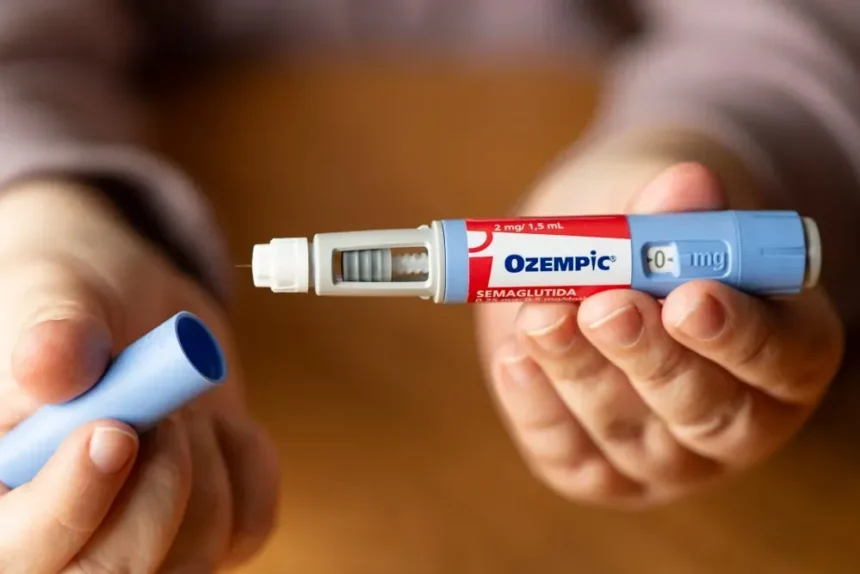SAN FRANCISCO – Researchers from SSM Health St. Louis University Hospital have shared new research that shows medications used for weight loss, such as Ozempic, might help men with obesity or Type 2 diabetes raise their testosterone levels. This finding connects better metabolic health with improved hormone levels, which could mean new treatment options for men dealing with low testosterone.
Study Overview: New Insights for Men’s Health
Dr. Shellsea Portillo Canales and her team at SSM Health St. Louis University Hospital looked at health records from 110 men with obesity or Type 2 diabetes who started on GLP-1 receptor agonists like semaglutide (Ozempic, Wegovy), dulaglutide (Trulicity), or tirzepatide (Zepbound).
These men, with an average age of 54, were not using testosterone replacement therapy or other hormone treatments. The team tracked their total and free testosterone levels for 18 months. On average, the men lost about 10% of their body weight.
After treatment, the number of men with normal testosterone levels jumped from 53% to 77%. The testosterone boost was smaller than what’s seen with direct hormone therapy, but it happened naturally and avoided the risks of taking extra hormones.
Dr. Portillo Canales pointed out that their research is one of the first to show that weight loss drugs used for obesity may reverse low testosterone in men. Previous work has shown that lifestyle changes or surgery can help raise testosterone, but this study spotlights GLP-1 drugs as a new tool for improving hormone health.
Low Testosterone and Its Effects
Testosterone is key for muscle, bone strength, sex drive, energy, and mood in men. Healthy levels range from 300 to 1,000 nanograms per deciliter, but they fall with age, reaching about 65% of typical young adult levels by age 75. Obesity and Type 2 diabetes cause this drop to happen faster. Belly fat, in particular, disrupts hormone signals and changes some testosterone into estrogen, which lowers testosterone further.
Low testosterone, also called hypogonadism, can cause fatigue, low sex drive, trouble getting or keeping an erection, weaker muscles, and a lower quality of life. It’s linked to bone loss, heart problems, and issues with how the body handles sugar. These problems pile up for men with obesity or Type 2 diabetes, since insulin resistance and inflammation make things worse.
Dr. Fatima Cody Stanford, an obesity physician at Massachusetts General Hospital and Harvard Medical School who was not involved in the study, commented that these results show how treating metabolic problems can improve both overall and reproductive health for men.
How GLP-1 Medications Work
GLP-1 receptor agonists like semaglutide and tirzepatide were first made to treat Type 2 diabetes. They copy a hormone that helps control blood sugar and curb appetite. Taken as weekly shots, these drugs help the pancreas release more insulin, lower glucagon, and slow digestion, leading to feeling full and helping with weight loss. Ozempic got FDA approval for diabetes in 2017, and Wegovy (a higher dose of semaglutide) was approved for obesity in 2021.
The SSM Health team found that these medications do more than just manage weight and blood sugar. Losing fat, especially around the organs, seems to help testosterone return to healthy levels. As body fat drops, insulin resistance often gets better and inflammation goes down, letting the body restore hormone production. Dr. Portillo Canales noted that as weight and insulin resistance improve, testosterone often rises as a result.
The study looked back at medical records, so it can’t prove that the drugs directly caused the hormone change. Other health improvements could also be part of the reason. More research is needed to confirm these early results, but what’s been found so far looks promising.
Who Benefits Most From Ozempic and Similar Medications?
GLP-1 drugs like Ozempic are approved in Canada and the United States for adults with Type 2 diabetes. Wegovy and Zepbound can be used for obesity (BMI of 30 or more) or for those with a BMI between 27 and 29.9 who have other weight-related issues, like high blood pressure or diabetes. These medications may be especially helpful for men struggling with both obesity and low testosterone, as they can address both problems at the same time.
Dr. Susan Spratt, a diabetes expert at Duke University School of Medicine who did not take part in the study, advised against using testosterone replacement for men whose levels are only slightly low. She said it’s better to treat obesity or diabetes first, which may raise testosterone naturally without added risks. These risks can include worse sleep apnea, acne, prostate problems, fewer sperm, blood clots, and prostate cancer growth.
Men already on testosterone therapy who start GLP-1 medications might need their hormone treatment adjusted or stopped if their levels return to normal. Anyone interested in these drugs should talk to their health provider to make sure they qualify and to go over side effects, which can include upset stomach, vomiting, diarrhea, and, on rare occasions, pancreatitis or kidney troubles.
Who Should Not Use GLP-1 Agonists?
GLP-1 medications are not for everyone. Ozempic isn’t approved in Canada or the US for weight loss alone, and using it for this purpose has led to shortages for people with diabetes. People without obesity or diabetes should try changing their diet and exercise habits first, as these are still the gold standard for weight management if BMI is under 30.
If someone stops using GLP-1 drugs, they may gain back the weight they lost, which could lower testosterone again. This shows why keeping up with lifestyle changes is important, whether or not someone uses medication. People with a history of pancreatitis, thyroid disease, or kidney problems should be careful with these medications. Using these drugs just for cosmetic weight loss can also increase weight stigma and unhealthy attitudes about body image.
What This Means for Men’s Health
The SSM Health study highlights a shift in treating obesity and hormone problems in men. By reducing excess body fat and improving insulin resistance and inflammation, GLP-1 medications may offer a less invasive option than hormone therapy, with benefits for both metabolic and reproductive health. Dr. Portillo Canales said that doctors can now look at these medications not just for diabetes or obesity, but also as a way to improve men’s hormone health.
There are still limits to the research, like the study’s design and lack of a control group, so more studies are needed to confirm the results and check for long-term safety and effectiveness. Dr. Stanford agreed that these findings help doctors and patients better understand how treating metabolic problems can also improve hormone balance.
Bottom Line
GLP-1 drugs like Ozempic may help men with obesity or Type 2 diabetes raise their testosterone levels, offering benefits beyond weight loss. While not the answer for everyone, these medications could help many men avoid riskier hormone therapies, as long as they meet the right criteria and make healthy lifestyle changes too. As more research comes out, men and their healthcare providers should look at both the benefits and possible downsides, and keep in mind the importance of long-term habits.
For men hoping to feel more energetic and improve their sexual health, addressing obesity and diabetes could do more than just change how they look—it might restore their hormones and boost their overall quality of life. Anyone interested in these treatments should talk to their doctor to see if GLP-1 medications fit their health needs.
Sources: NBC News














